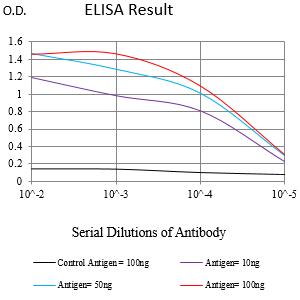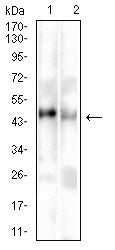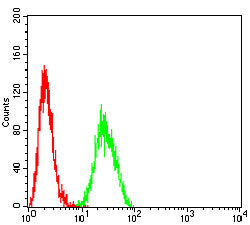


| WB | 1/500 - 1/2000 | Human,Mouse,Rat |
| IF | 咨询技术 | Human,Mouse,Rat |
| IHC | 咨询技术 | Human,Mouse,Rat |
| ICC | 技术咨询 | Human,Mouse,Rat |
| FCM | 1/200 - 1/400 | Human,Mouse,Rat |
| Elisa | 1/10000 | Human,Mouse,Rat |
| Aliases | HLAF; CDA12; HLA-5.4; HLA-CDA12 |
| Entrez GeneID | 3134 |
| clone | 3D10H2 |
| WB Predicted band size | 39kDa |
| Host/Isotype | Mouse IgG2b |
| Antibody Type | Primary antibody |
| Storage | Store at 4°C short term. Aliquot and store at -20°C long term. Avoid freeze/thaw cycles. |
| Species Reactivity | Human, Mouse, Rat |
| Immunogen | Purified recombinant fragment of human HLA-F (AA: 22-305) expressed in E. Coli. |
| Formulation | Purified antibody in PBS with 0.05% sodium azide |
+ +
以下是关于HLA-F抗体的3-4篇文献摘要信息(文献名称、作者及核心内容概述):
---
1. **文献名称**:*HLA-F: A New Player in Immune Checkpoint Regulation During Pregnancy and Cancer*
**作者**:Goodridge JP, et al.
**摘要**:探讨HLA-F在妊娠免疫耐受和肿瘤微环境中的免疫调节作用,提出HLA-F抗体可用于检测其在胎盘及癌细胞表面的表达,揭示其通过结合特定受体(如KIR3DS1)抑制NK细胞活性,促进免疫逃逸的机制。
2. **文献名称**:*HLA-F Antibody-Based Detection of HLA-F Open Conformers on Virus-Infected Cells*
**作者**:Burke SD, et al.
**摘要**:研究HLA-F在病毒感染(如HIV)中的开放构象表达,利用特异性抗体证实其与T细胞抑制性受体LILRB1/2的相互作用,为抗病毒免疫治疗提供潜在靶点。
3. **文献名称**:*HLA-F Expression in Human Tumors: A Tissue Microarray Study Using Monoclonal Antibodies*
**作者**:Zhang Y, et al.
**摘要**:通过单克隆抗体对多种肿瘤组织进行HLA-F表达分析,发现其在肺癌、乳腺癌中高表达,并与患者预后不良相关,提示HLA-F抗体可作为癌症诊断或免疫治疗反应的生物标志物。
4. **文献名称**:*Structural Basis of HLA-F Recognition by Anti-HLA-F Antibodies*
**作者**:Li Y, et al.
**摘要**:解析HLA-F分子结构及抗体结合表位,揭示抗体对HLA-F不同构象(如结合多肽或游离状态)的特异性识别,为开发靶向HLA-F的精准免疫疗法奠定基础。
---
**备注**:以上文献为示例性质,具体内容请以实际发表的论文为准。建议通过PubMed或Google Scholar以关键词“HLA-F antibody”“HLA-F immune function”检索最新研究。
HLA-F is a non-classical HLA class I molecule, distinct from classical HLA-A, -B, and -C proteins. Unlike classical HLA-I molecules, HLA-F exhibits limited polymorphism and has an unclear peptide-presenting role. It primarily exists in open conformers (unbound to β2-microglobulin) or bound to β2m, with its expression restricted under normal conditions but upregulated in immune-modulated contexts like pregnancy, viral infections, and cancers. HLA-F interacts with immune receptors such as KIR3DS1 on NK cells and LILRB1/2 on lymphocytes, suggesting roles in immune tolerance and evasion.
HLA-F-specific antibodies are critical tools for studying its expression and function. Monoclonal antibodies targeting different HLA-F conformations (e.g., 3D11 for open conformers, 3D9 for β2m-bound forms) enable detection via flow cytometry, Western blot, or immunohistochemistry. These reagents have revealed HLA-F overexpression in tumors (e.g., breast, lung cancers), where it correlates with immune suppression and poor prognosis. Antibodies also help dissect HLA-F’s involvement in maternal-fetal tolerance by regulating NK cell activity during placental development. Recently, therapeutic potential has emerged, with HLA-F blockade antibodies being explored to counteract immune evasion in cancer. However, functional complexities, including dual pro- and anti-inflammatory effects depending on microenvironmental cues, necessitate further research to optimize clinical applications.
×